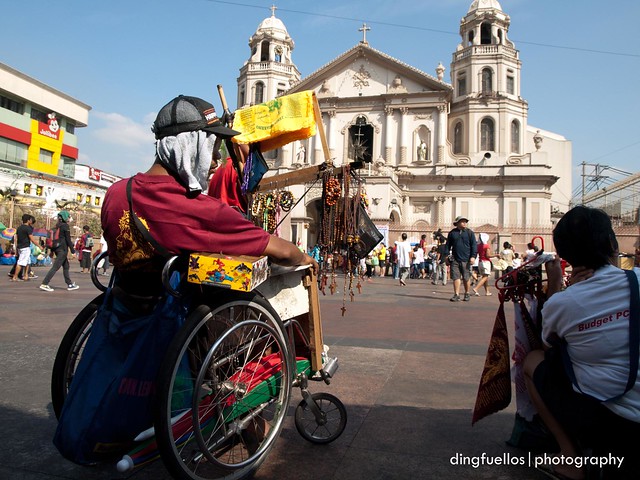In the past weeks, I was wondering what do Technocrati authority, blog juice, ranking, popularity and being influential means for a blog and the blogger. Bloggers in the Philippines would probably count to hundreds of thousands, if not in at least a million that landing in the Top 100 popular blogs or even the Top 10 most influential blogs, or even cited as the best blog of the year would definitely be a mind-blowing experience and significant feat for the blogger.
As a result, blogging becomes a rat-race, and their authors would try all the possibilities to outshine other bloggers. We resort to installing widgets, signing in the popularity race, and some even resort to advertising their blogs for them to get some attention.
In a few months of blogging, I also asked if these ranking, authority and popularity widgets are really important. At the least, I would say yes. It becomes an indication whether you have readers, actually. I, myself, was surprised to learn that even
Manolo Quezon III linked me in one of his articles 2 months ago (see my Technocrati).
Earlier this month, I submitted my blog in the ranking of the so-called grassroots blogging society--Pinoy Bloggers Society a.k.a. PinoyBlogoSphere or PBS. Knowing that I landed in 270+ ranking out of 315 members who submitted their blog for ranking, was disheartening at the start. Although I didn't care if nobody visits my blogsite, I also surmised what would be the purpose of writing blogs if nobody would read them anyway? So I tried experimenting on some topics, which would be of interest to me, and at the same time, would engender interest among my very few readers. In a few days, I was surprised with what I saw. My PBS Ranking improved from 270+ to 208 today (August 11). It feels good—definitely! Also, even if I seldom see any comment in my blog entries, my site counter reveals that I have visitors, which also means that I am not wasting my precious idle time to run a simple analysis of the Top 100 blogs in the PBS. Perhaps, Filipinos are not really fond of giving out comments or remarks. It is a cultural thing.
However, some blogs like that of Eric (
Señor Enrique) does not even have link widgets, but his blog is very popular that most of the blogs I visit link his site. So what makes his blog become the daily fare for most of us?
This prompted me to do a simple analysis of the Top 100 blogs of the PBS (This ranking is as of 2:05PM, August 11, 2007). With the information on the ranking of the PBS, here is what I have found out:

There are 20 blog categories which landed in the Top 100. I grouped similar blogs for easy presentation and analysis and came up with the following categories:
- Entertainment and the Arts - includes the entertainment industry, photo blogs, news and media, arts, and music.
- Personal – anything under the sun—be it entertainment, politics and governance, IT, lifestyle, family life, friendships, etc.
- Information technology – includes blogging technology, internet, video games, computers, internet resources
- Outdoor Lifestyle – includes travel, sports and recreation
- Group and Community – communities like PBS, mostly Pinoy communities
- Fashion and Lifestyle
- Business and Entrepreneurship
- Humor
- Academics
- Socio-political
- Home and Living
Based on the aggregated or re-classified categories, the top three are:
- Entertainment and the Arts (33%)
- Personal (25%)
- Information technology (15%)
They comprise 59% of all the blogs.
Thus, I have the following impressions (not conclusions yet, since my “study” is not scientific):
The blogging community prefers to be entertained and make blogging a personal experience, one reads or writes blogs to unwind, rather than engage in mind-wracking social concerns. They want to dwell on the more mundane aspect of living—its nitty-gritty and not the macro issues that beset the country. Perhaps, we already have enough of these in the news and public affairs shows and in broadsheets. You will see why politics, economics and social issues do not augur well for most of the Filipino bloggers. But it does not mean we do not have to discuss these issues. However, your discussion of these issues, like the way MLQIII expresses his punditry on these social issues, must be well written and well thought—then you will have a following like him.
Ergo, if you want to be popular, write topics on entertainment, travel, and lessons from personal experiences. In so-doing, it becomes probable that you will have the chance to land at least in the top 59% of the group. If you want to discuss about pressing issues, then you must have the authority of a Manolo Quezon or Dean Jorge Bocobo.
The novelty of ideas drawn from the personal experiences and the noble lessons derived from them becomes meaningful to the lives of readers if you will be able to touch their heart and tickle their funny side like that of Empress Maruja. Although his personal blog is somewhat “obscene” in some cases, he gets away with it. In the end, we become entertained. He has the novelty of ideas especially when he revived his “Empress Balita,” which gives a funny and unusually creative point-of-view to what is an already published story about actors and actresses. Señor Enrique, on the other hand, is so effective in painting another version of Quiapo and its environs by including some heartwarming and mind-provoking stories, which adds life and color to his otherwise mundane photos of these areas.
Just like how fast the popularity ranking is, the behavior of the blogging community is also shifting significantly. Blogging was introduced as a personal online diary. Suddenly, it becomes a venue for sharing learning from experiences, counseling, networking, information sharing, technology coaching, and advocacy, among others.
At this point, we can say that blogging will continue to flourish as a venue for reaching out to people. In the near future, it will take the center stage, perhaps replacing the other forms of the tri-media in terms of popularity and as a preferred site for communication.
With its power to communicate and change lives, this medium, therefore, should not be exploited not only for personal gains, but eventually in helping shape our society the way we wanted it to be. Gleaning from our present situation, our personal blogs, in a way, affects our readers. Perhaps, we have influenced their way of life.
While we vie for popularity, perhaps, it would not hurt if we also inject some form of social responsibility in our blogs.
 Of course we know who Luke Skywalker is, but have you ever wondered where Mark Hamill is and what he has been doing nowadays? Hamill, the actor who portrayed Skywalker’s character in the Episodes IV, V, and VI of Star Wars, seem to have vanished into the galaxy after he did the flicks in the late 70s and early 80s.
Of course we know who Luke Skywalker is, but have you ever wondered where Mark Hamill is and what he has been doing nowadays? Hamill, the actor who portrayed Skywalker’s character in the Episodes IV, V, and VI of Star Wars, seem to have vanished into the galaxy after he did the flicks in the late 70s and early 80s.
 Mark Hamill now.
Mark Hamill now. 

























